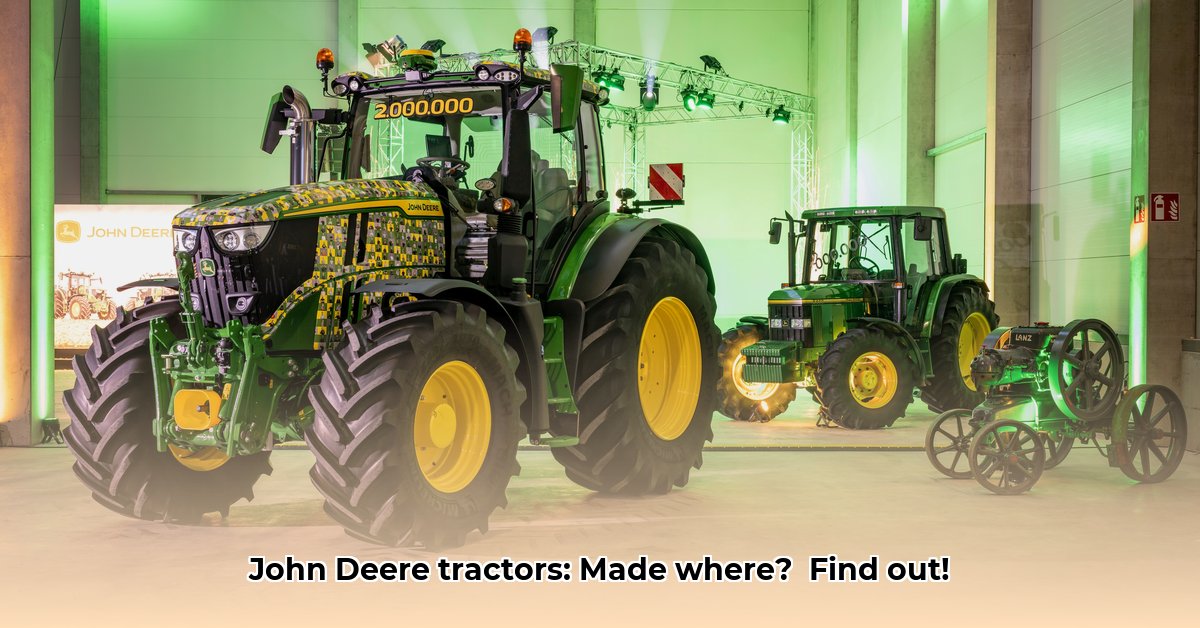
A Worldwide Network of Tractor Production
John Deere tractors are iconic symbols of American agriculture, but their production story is far from confined to the US heartland. The simple answer to "Where are John Deere tractors made?" is: around the globe. This isn't a haphazard approach; it's a carefully orchestrated strategy reflecting a sophisticated understanding of global markets and supply chains. Major production hubs exist in the United States, with significant facilities in Iowa, Georgia, and Kansas. However, John Deere also boasts substantial manufacturing plants in Mexico, Brazil, Germany, India, and China. This dispersed manufacturing network allows John Deere to efficiently meet regional demands, customize tractors for unique local needs, and minimize transportation costs. But this global reach also presents fascinating complexities. For more on John Deere collectibles, see this site.
Balancing Global Reach with Local Preferences
Why this geographically diverse manufacturing strategy? The answer lies in a blend of strategic advantages. Proximity to markets allows John Deere to respond rapidly to fluctuating demands. Farmers in India have different needs than those in Iowa, for example; local production facilitates the creation of tractors tailored to specific regional conditions and preferences. But this creates a nuanced debate. How "American" is a tractor assembled in Brazil? This question highlights the lack of complete transparency around the origin of components and assembly locations, impacting consumer perception. While some prioritize a "Made in the USA" label, others prioritize affordability and functionality.
How many John Deere factories are there worldwide? While the exact number isn't publicly released, the extensive global presence highlights the company's commitment to serving a diverse international customer base. This complex network of production sites requires efficient coordination and logistics, creating a significant operational challenge.
The Impact of Global Trade and Politics
John Deere’s global manufacturing network isn't immune to the vagaries of international trade and geopolitics. International trade agreements, tariffs, and local regulations concerning locally sourced parts significantly influence production decisions and the final price. High tariffs on imported components, for instance, could necessitate shifts in assembly locations to maintain cost-effectiveness. This highlights the intricate interplay between economics and international relations influencing the manufacturing landscape.
What are the global implications of John Deere's manufacturing decisions? The company's strategies influence international trade dynamics, impacting economies and employment levels in multiple countries.
Who's Involved and What Matters to Them?
John Deere's global production model impacts several stakeholders:
- John Deere: The company seeks a balance between cost optimization, market access, and brand reputation management. Efficient supply chain management globally and adaptation to international regulations are ongoing challenges.
- Farmers: Farmers prioritize reliable, affordable, and effective machinery. The "Made in..." label is undeniably a factor, but performance and cost often outweigh origin.
- Governments: Government interests include domestic job creation, fair trade practices, environmental protection, and the enforcement of safety and labor standards. Their regulations profoundly shape John Deere's operations.
The Ongoing Journey: Challenges and Future Opportunities
Maintaining a vast global manufacturing network presents ongoing challenges. Unforeseen events like global pandemics or natural disasters disrupting the supply chain require proactive risk management. Ensuring consistent quality and prompt service worldwide demands significant logistical and operational expertise. However, this global reach also unlocks substantial opportunities. John Deere can tailor tractors to specific regional conditions and preferences, boosting sales and customer satisfaction.
How does John Deere manage the complexities of its global supply chain? Deere employs sophisticated logistical and risk management strategies to mitigate disruptions and ensure the smooth flow of goods and services worldwide.
Transparency: The Key to Future Success
Where are John Deere tractors made? The answer is multifaceted. While the precise details of its global network may not be fully transparent, increased disclosure would likely boost customer trust and empower more informed purchase decisions. John Deere's continued success depends on navigating the complexities of global manufacturing while maintaining its reputation for quality, reliability, and innovation. The story of John Deere tractor production is one of constant evolution.
Key Takeaways:
- John Deere's tractor production is a global endeavor, with multiple manufacturing facilities worldwide.
- This global strategy balances the need to serve diverse markets with local preferences and cost efficiency.
- Navigating global trade, political climates, and ethical considerations is essential for long-term success.
What is John Deere's commitment to sustainability in its global operations? While not explicitly detailed in the provided text, the article implies that the company is aware of the growing importance of sustainable practices in its operations and industry.